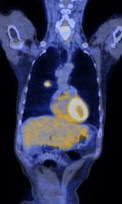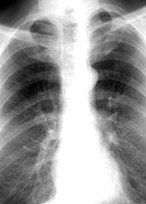Positron Emission Tomography (PET)
Positron emission tomography (PET) is a noninvasive diagnostic imaging procedure that assesses biological processes at the molecular level. A PET camera produces cross-sectional tomographic images, which are obtained from positron-emitting radioactive tracers (radiopharmaceuticals) that are administered intravenously to the patient. Examples of clinical PET studies include the assessment of metabolic activity in tumors, brain tissue, and heart muscle using F-18 fluorodeoxyglucose (FDG), and the evaluation of blood flow to the heart muscle using Rubidium-82.
At UC Davis Medical Center, the PET studies are performed using either of our two installed multi-slice PET/CT scanners, which combine both a PET camera and a CT scanner to image the patient during the same examination. The resulting PET and CT images are then combined to provide precise anatomical localization of disease processes.
Applications of PET/CT include
-
Oncology: Diagnosis, staging, and restaging of tumors. Evaluating response to therapy.
-
Cardiology: Diagnosis and evaluation of coronary artery disease.
-
Neurology: Diagnosis of brain disorders, such as Alzheimer’s, Parkinson’s, & seizures
PET/CT scans offer patients life-saving information that helps their doctors detect and diagnose disease early, and begin treatment quickly. Medicare and most insurance companies now provide coverage for this examination.
What to expect: Most PET scans (both FDG tumor and cardiac) require the patient to fast for 4 to 6 hours prior to the appointment (specific instructions vary by scan/radiotracer type). Patients who take medication for diabetes may need special instructions if fasting is required. For brain and body imaging studies, there will be a waiting period of about an hour between the intravenous administration of the FDG and the beginning of the scan. Time spent on the scanner table varies, depending upon the length of the body part being imaged. Brain imaging requires about 10-20 minutes. Body imaging requires about 20-30 minutes if legs and feet are excluded, and about 45 minutes to image the entire body. Cardiac imaging time is variable, depending upon whether a stress test is needed as part of the exam. Patients who require medication for claustrophobia or pain control may wish to bring their own prescription medication, and should be accompanied by someone who can drive them home.
|
|
 |
 |
Our Team
Click here to learn more about our Positron Emission Tomography faculty.

